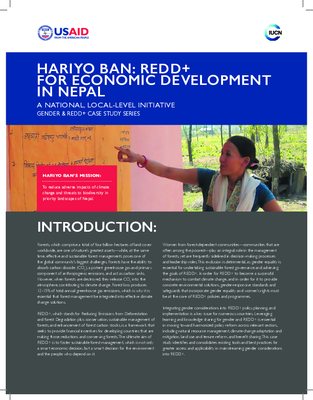Hariyo Ban: REDD+ for Economic Development in Nepal: A national, local-level initiative
The Hariyo Ban project—which is named after the Nepali saying “Hariyo Ban Nepal ko Dhan” meaning “healthy green forests are the wealth of Nepal”—is a five-year initiative (2011-2016) that aims to reduce the adverse impacts of climate change and threats to biodiversity in Nepal. The project intends to ensure meaningful engagement of women and socially excluded groups in REDD+ initiatives by building their knowledge and capacity, as well as increasing gender-responsive REDD+ policy design. The Hariyo Ban supports the broader conservation and development objectives and strategies of the Government of Nepal and works closely with the government in program implementation. Additionally, by working with Nepal’s communities, civil society, private sector, academia and media, the program endeavors to empower locals in safeguarding the country’s living heritage and adapting to climate change through sound conservation and livelihood approaches.
https://biodiversitylinks.org/projects/current-global-projects/agent/resources/hariyo-ban-redd-for-economic-development-in-nepal-a-national-local-level-initiative/view
https://biodiversitylinks.org/projects/current-global-projects/agent/resources/hariyo-ban-redd-for-economic-development-in-nepal-a-national-local-level-initiative/@@download/image/image.png
File
Hariyo Ban: REDD+ for Economic Development in Nepal: A national, local-level initiative
The Hariyo Ban project—which is named after the Nepali saying “Hariyo Ban Nepal ko Dhan” meaning “healthy green forests are the wealth of Nepal”—is a five-year initiative (2011-2016) that aims to reduce the adverse impacts of climate change and threats to biodiversity in Nepal. The project intends to ensure meaningful engagement of women and socially excluded groups in REDD+ initiatives by building their knowledge and capacity, as well as increasing gender-responsive REDD+ policy design. The Hariyo Ban supports the broader conservation and development objectives and strategies of the Government of Nepal and works closely with the government in program implementation. Additionally, by working with Nepal’s communities, civil society, private sector, academia and media, the program endeavors to empower locals in safeguarding the country’s living heritage and adapting to climate change through sound conservation and livelihood approaches.



